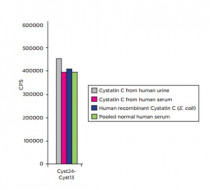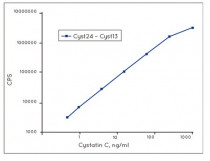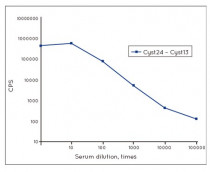ARG10618
anti-CST3 / Cystatin C antibody [Cyst24]
anti-CST3 / Cystatin C antibody [Cyst24] for ELISA,FLISA and Human
Overview
| Product Description | Mouse Monoclonal antibody [Cyst24] recognizes CST3 / Cystatin C |
|---|---|
| Tested Reactivity | Hu |
| Tested Application | ELISA, FLISA |
| Specificity | Cystatin C |
| Host | Mouse |
| Clonality | Monoclonal |
| Clone | Cyst24 |
| Isotype | IgG1 |
| Target Name | CST3 / Cystatin C |
| Antigen Species | Human |
| Immunogen | Human Cystatin C |
| Conjugation | Un-conjugated |
| Alternate Names | Cystatin-C; Neuroendocrine basic polypeptide; Post-gamma-globulin; ARMD11; Cystatin-3; Gamma-trace |
Application Instructions
| Application Suggestion |
|
||||||
|---|---|---|---|---|---|---|---|
| Application Note | * The dilutions indicate recommended starting dilutions and the optimal dilutions or concentrations should be determined by the scientist. |
Properties
| Form | Liquid |
|---|---|
| Purification | Purification with Protein A. |
| Buffer | PBS (pH 7.4) and 0.1% Sodium azide |
| Preservative | 0.1% Sodium azide |
| Storage Instruction | For continuous use, store undiluted antibody at 2-8°C for up to a week. For long-term storage, aliquot and store at -20°C or below. Storage in frost free freezers is not recommended. Avoid repeated freeze/thaw cycles. Suggest spin the vial prior to opening. The antibody solution should be gently mixed before use. |
| Note | For laboratory research only, not for drug, diagnostic or other use. |
Bioinformation
| Database Links | |
|---|---|
| Gene Symbol | CST3 |
| Gene Full Name | cystatin C |
| Background | The cystatin superfamily encompasses proteins that contain multiple cystatin-like sequences. Some of the members are active cysteine protease inhibitors, while others have lost or perhaps never acquired this inhibitory activity. There are three inhibitory families in the superfamily, including the type 1 cystatins (stefins), type 2 cystatins and the kininogens. The type 2 cystatin proteins are a class of cysteine proteinase inhibitors found in a variety of human fluids and secretions, where they appear to provide protective functions. The cystatin locus on chromosome 20 contains the majority of the type 2 cystatin genes and pseudogenes. This gene is located in the cystatin locus and encodes the most abundant extracellular inhibitor of cysteine proteases, which is found in high concentrations in biological fluids and is expressed in virtually all organs of the body. A mutation in this gene has been associated with amyloid angiopathy. Expression of this protein in vascular wall smooth muscle cells is severely reduced in both atherosclerotic and aneurysmal aortic lesions, establishing its role in vascular disease. In addition, this protein has been shown to have an antimicrobial function, inhibiting the replication of herpes simplex virus. Alternative splicing results in multiple transcript variants encoding a single protein. [provided by RefSeq, Nov 2014] |
| Function | As an inhibitor of cysteine proteinases, this protein is thought to serve an important physiological role as a local regulator of this enzyme activity. [UniProt] |
| Highlight | Related Antibody Duos and Panels: ARG30282 Cystatin C ELISA Antibody Duo Related products: CST3 antibodies; CST3 ELISA Kits; CST3 Duos / Panels; Anti-Mouse IgG secondary antibodies; |
| Calculated MW | 16 kDa |
| PTM | The Thr-25 variant is O-glycosylated with a core 1 or possibly core 8 glycan. The signal peptide of the O-glycosylated Thr-25 variant is cleaved between Ala-20 and Val-21. |
Images (3) Click the Picture to Zoom In
-
ARG10618 anti-CST3 / Cystatin C antibody [Cyst24] FLISA image
FLISA: Immunochemical properties of three forms of cystatin C protein, in comparison with antigen from pooled normal Human serum. Cystatin C preparations (at concentration 10 ng/ml) and diluted pooled normal Human serum were analyzed. FLISA was used to measure cystatin C: Capture MAbs: ARG10618 anti-CST3 / Cystatin C antibody [Cyst24]. Detection MAbs: ARG10617 anti-Cystatin C antibody [Cyst13].
-
ARG10618 anti-CST3 / Cystatin C antibody [Cyst24] FLISA image
FLISA: Calibration curve of the best immunoassays. One-step fluoroimmunoassay in streptavidin coated plates. Capture MAb ARG10618 anti-CST3 / Cystatin C antibody [Cyst24] is biotinylated (200 ng/well). Detection MAb ARG10617 anti-Cystatin C antibody [Cyst13] is Eu3+ - labeled (200 ng/ml).
Incubation volume 100 µl. time: 30 min at RT. -
ARG10618 anti-CST3 / Cystatin C antibody [Cyst24] FLISA image
FLISA: Titration curve of pooled normal Human serum in ARG10618 anti-CST3 / Cystatin C antibody [Cyst24] - ARG10617 anti-CST3 / Cystatin C antibody [Cyst13] (capture - detection) sandwich fluoroimmunoassays.








